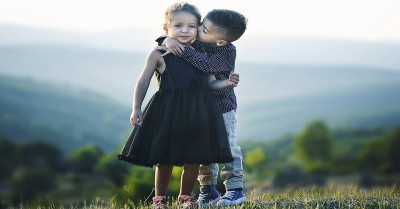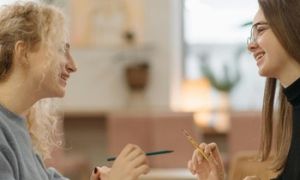Friendships, bring pleasure, comfort, and important opportunities to learn and develop in a social world. Friends, help children feel good about themselves, help the child adapt more easily to early childhood environments and help the child build self-confidence.
Making friends is a vital part of growing up and an essential part of social and emotional development. Attributes such as social competence, self-esteem, and self-confidence have all been found to be positively correlated to having friends. Studies have found that friendships enable children to learn more about themselves and develop their own identity and sense of belonging.
Children need to learn friendship skills. As they play with others, they build skills that help with their friendships now and in the future. Skills such as sharing, taking turns, cooperating, listening to others, managing disagreement, and negotiating different ways of thinking about things.
The Benefits of Childhood Friendships
There are many benefits to be gained for children to form and maintain friendships. Such as:
- Navigating friendships helps to support children’s emotional and social development
- Friendships help to increase a child’s capacity for empathy and altruism
- Having friends boosts happiness, well-being and self-confidence, and promotes a positive outlook on life
- Having friends lessens stress
- Forming friendships entail practising communication skills
- Positive friendships can help encourage good behaviour
Supporting Children Developing Friendships
At times friendships are not always straightforward. Children can sometimes struggle with friendship issues, but preschoolers in particular often need more support in dealing with certain aspects. Here are some suggestions about how to support children develop their friendships:
- Model good friendship behaviour - Model the behaviour that you are trying to encourage. This means interacting positively with other educators in front of the children, being kind, and cooperating with each other.
- Nurture politeness - Being polite to everyone should be a vital factor within your service. Encourage the children to talk to each other and Educators in a polite way, for example by teaching them how to ask for things nicely, saying please and thank you, etc.
- Practise sharing - Learning to share and take turns is fundamental to being able to form friendships. Have frequents discussions with children about sharing and taking turns, role play, encourage children while playing to practice these skills.
- Group activities - Small group activities are good for encouraging children to play cooperatively. Such as ball games, parachute games, group art activities etc.
- Books and role play - Explore issues around friendships. Find books that are about friendship; read and discuss them with the children. Using toys or puppets, get the children to act out and role play
- Encourage and praise - Recognise good behaviour towards other children by commenting on it; describe what happened in a simple way so that the children understand, eg “giving Sophie that toy, when she asked for it, was a very kind thing to do”.
Dealing With Friendship Problems
There’ll be times when play between friends doesn’t work out the way that's planned. Here is some ideas on how to support children during friendship problems.
- Children behaving aggressively - An occasional disagreement with a friend is normal. If shouting or hitting starts, step in and guide the children’s behaviour. In this situation, it’s important to be clear about what needs to stop and why. For example, ‘Please stop pushing each other. You’re both getting hurt’.
If a child seems unsure of how to join in play, is consistently left out by other children, or often doesn’t want to play with others, here is how you can help:
Encourage the child to watch what others are doing so they can work out how to join in. For example, ‘What’s Bella doing what that food? Do you think she might be setting up a restaurant? Do you think it might need customers? Or a cook?’
Talk about ways the child could start play and invite others to join. For example, ‘Can you help me dig a hole in the sand? Can you see if anyone else will help us make it really deep?’
‘You’re not my friend!’
Children sometimes say things like ‘You’re not my friend’. Some children might be hurt by this, and others seem able to shake it off. Often children sort things out and are ‘friends’ again minutes later.
Having a positive sense of identity and experiencing respectful, responsive relationships strengthens children’s interest and skills in being and becoming active contributors to their world. Children show interest in how others regard them and understandings about friendships. They develop understandings that their actions or responses affect how others feel or experience belonging.
References:
- Never Underestimate The Importance Of Early Childhood Friendships, Cambridge Preschools
- Preschoolers Making Friends, Raising Children
- Children and The Benefits Of Friendships, Raising Children
- Benefits Of Childhood Friendships, First Discovers UK



 Open ended questions cannot be responded to with one word answers such as yes or no. These types of questions enables a child to provide
Open ended questions cannot be responded to with one word answers such as yes or no. These types of questions enables a child to provide During your child’s preschool years, an important milestone begins to emerge. This is the development of pre-writing skills. Pre-writing skills are used to encourage, develop
During your child’s preschool years, an important milestone begins to emerge. This is the development of pre-writing skills. Pre-writing skills are used to encourage, develop An Acknowledgment of the Country is a way of showing respect for the Traditional Owners and can be given by both non-Indigenous people and Aboriginal
An Acknowledgment of the Country is a way of showing respect for the Traditional Owners and can be given by both non-Indigenous people and Aboriginal Open ended materials enables children to play freely. They are objects that have no rules to follow, use or function. Raw materials that can be
Open ended materials enables children to play freely. They are objects that have no rules to follow, use or function. Raw materials that can be Language plays an important role in a child’s development. It enables a child to communicate effectively with their family, learn at school, socialize with friends,
Language plays an important role in a child’s development. It enables a child to communicate effectively with their family, learn at school, socialize with friends, Like adults, children have to deal with their own stress in life. Moving house, starting a new school, preparing for a new sibling - these are
Like adults, children have to deal with their own stress in life. Moving house, starting a new school, preparing for a new sibling - these are Playdough is such a versatile material. It provides numerous benefits to children as they manipulate it, it is safe and soothing and provides children with
Playdough is such a versatile material. It provides numerous benefits to children as they manipulate it, it is safe and soothing and provides children with Teaching children about sustainability enables them to appreciate and respect the natural environment. Early childhood services can provide meaningful hand on learning experiences in order
Teaching children about sustainability enables them to appreciate and respect the natural environment. Early childhood services can provide meaningful hand on learning experiences in order Recycling is an important concept that teaches children to care for the environment. It encourages children to be responsible and show a growing appreciating for
Recycling is an important concept that teaches children to care for the environment. It encourages children to be responsible and show a growing appreciating for Incursions provide children with the opportunity to explore meaningful learning experiences in the comfort of their early childhood service. The following provides a directory of
Incursions provide children with the opportunity to explore meaningful learning experiences in the comfort of their early childhood service. The following provides a directory of


